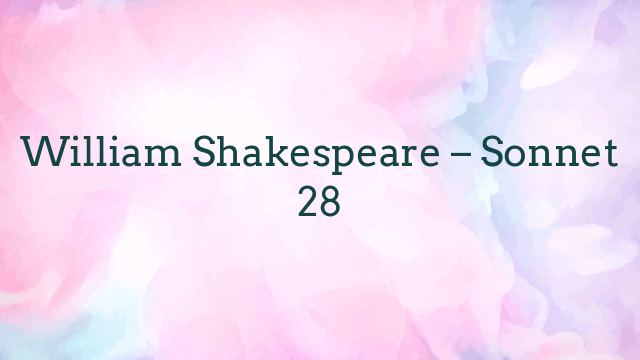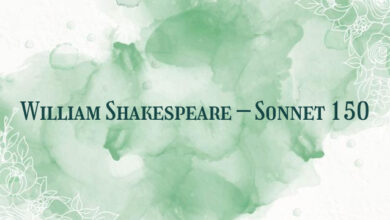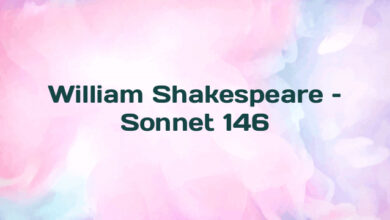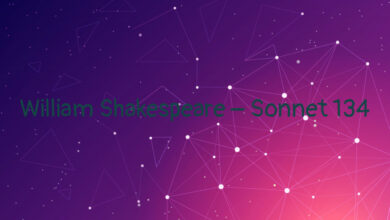
William Shakespeare – Sonnet 28
How can I then return in happy plight,
That am debarred the benefit of rest?
When day’s oppression is not eas’d by night,
But day by night and night by day oppressed,
And each, though enemies to either’s reign,
Do in consent shake hands to torture me,
The one by toil, the other to complain
How far I toil, still farther off from thee.
I tell the day, to please him thou art bright,
And dost him grace when clouds do blot the heaven:
So flatter I the swart-complexion’d night,
When sparkling stars twire not thou gild’st the even.
But day doth daily draw my sorrows longer,
And night doth nightly make grief’s length seem stronger.
This continues the complaint of the previous sonnet. Evidently he is far removed from his beloved, and he sees in this a conspiracy between day and night to torture him. In his distress he attempts to placate both day and night by telling them that the beloved youth adds to them an extra glory by his radiance. But this has no effect and he is forced continually to commiserate with his own sorrows, reflecting that during the day he cannot be with the youth, and at night cannot sleep for continually thinking of him.
The 1609 Quarto Version
HOw can I then returne in happy plight
That am debard the benefit of reſt?
When daies oppreſſion is not eazd by night,
But day by night and night by day opreſt.
And each(though enimes to ethers raigne)
Doe in conſent ſhake hands to torture me,
The one by toyle,the other to complaine
How far I toyle,ſtill farther off from thee.
I tell the Day to pleaſe him thou art bright,
And do’ſt him grace when clouds doe blot the heauen:
So flatter I the ſwart complexiond night,
When ſparkling ſtars twire not thou guil’ſt th’ eauen.
But day doth daily draw my ſorrowes longer,
And night doth nightly make greefes length ſeeme ſtronger
Commentary
1. How can I then return in happy plight,return – i.e. from the journey described in the previous sonnet, a journey that his mind takes when he is asleep, or trying to sleep.
in happy plight = in a happy state of mind, in a contented frame of mind.2. That am debarred the benefit of rest?That amdebarred = since I am deprived of, prevented from taking etc.3. When day’s oppression is not eas’d by night,Day’s oppression = the oppressiveness of the day, (in that you are absent and I cannot enjoy your company). See line 8.4. But day by night and night by day oppressed,Day is oppressed by night’s sleeplessness, and night by the toil of being far off from the beloved youth.5. And each, though enemies to either’s reign,In mythology Day and Night, personified as gods (or goddesses) would hate each other. Night was considered to be evil, and Day brought back light and goodness.6. Do in consent shake hands to torture me,shake hands – i.e. as confirming a bargain. The imagery is perhaps that of securing a business transaction. Elsewhere Shakespeare uses the hand shake as a simple gesture of farewell. For example:
O sun, thy uprise shall I see no more:
Fortune and Antony part here; even here
Do we shake hands. AC.IV.12.18-20.7. The one by toil, the other to complainThe one by toil – i.e. day gives him work to do, or makes him travel; the other to complain – night forces him to commune with his thoughts, which are querulous.8. How far I toil, still farther off from thee.What a great distance it is from you that I am when I forced to labour on this journey.
still = ever, always.9. I tell the day, to please him thou art bright,him refers to the day; thou refers to the beloved. Thus ‘In order to please the day, I tell it that my beloved is bright, thus easing it of the burden of perpetually giving light to the world’. Or ‘I tell the day that my beloved radiates light deliberately in order to please it (the day), by giving light when it is overcast’. See the following line.10. And dost him grace when clouds do blot the heaven:him = the day, as in the line above. The thought is that the beauty of his beloved makes the day beautiful and compensates for it being at times gloomy and overcast.11. So flatter I the swart-complexion’d night,So flatter I = I also flatter; in just the same way I flatter. flatter could also have the meaning of ‘stroke’.
swart-complexion’d = of dark complexion, grim faced.12. When sparkling stars twire not thou gild’st the even.
twire = twinkle. When the skies are overcast stars cannot be seen.
gild’st = make golden; enrich with gold. ‘To gild’ is to cover with gold leaf, a craft much called upon by the wealthy and powerful.
the even = the evening.13. But day doth daily draw my sorrows longer,draw = stretch, extend. Possibly a reference to torture, the drawing of someone on the rack. The word was alos used of the ultimate punishment of being ‘hung, drawn and quartered’, referring to the pulling out of the entrails from the body.14. And night doth nightly make grief’s length seem stronger.
I am inclined to think that longer and stronger might have been interchanged in these two lines or that length in this line should read strength, as suggested by Capell.. This would give a more pleasing assonance to the final line, whereas grief’s length seem stronger reads rather clumsily. It is difficult to make a length stronger. But perhaps the awkwardness of the line is intended deliberately to echo the nightmare of grief.






